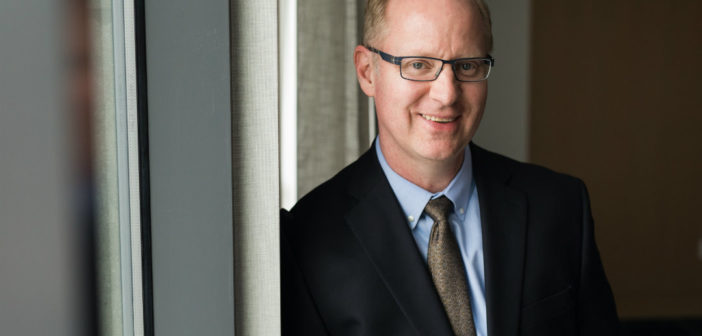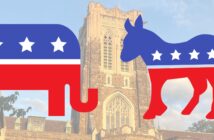Nathan Urban will replace Pat Farrell as provost in fall 2020. Urban worked at Carnegie Mellon University as a distinguished professor of the biological science department and sat in as interim provost from 2014 to 2015. He is currently the vice provost for graduate studies and strategic initiatives at University of Pittsburgh, as well as a professor and associate chair for the department of neurobiology.
The Brown and White conducted an email interview with Urban to explore his upcoming initiatives and goals as provost.
Q: What are some initiatives you are planning as the new Provost of Academic Affairs at Lehigh?
Nathan Urban: At this point, it’s a bit early for me to identify the specific initiatives that will be my initial focus. I really want to hear from the students, faculty, staff and alumni about the things that they think make Lehigh special — about the things that are working well and areas where we can make improvements.
I have a lot to learn about Lehigh but, from what I have seen and heard thus far, I see great opportunities in further developing and expanding the opportunities for experiential learning for undergraduates and interdisciplinary research, which are already strengths of Lehigh. Learning in the classroom provides a critical foundation, but I strongly believe that universities need to give students opportunities to put the knowledge that they gain in the classroom to use. In part, this means expanding research across the university because getting engaged in faculty-led research is one of the best opportunities for students both to apply their knowledge and to understand how new knowledge gets discovered and created.
Q: Why did you decide to come to Lehigh?
NU: I was attracted to Lehigh because of its great history and the strong sense of community that I sense among Lehigh students, faculty, staff and alumni. So many Lehigh people I have met have an incredibly strong bond with the place. I really enjoy working in environments that have such a strong sense of community. I also think that given its current strengths and areas that are being expanded, Lehigh is a place that can be even stronger and have greater impact in the future than it does today. I see universities as places that make the future — through both our research and educational activities. We need to be ahead of the curve. We need to prepare our students to lead in careers and industries that don’t yet exist and also to do research that will shape the future of science, technology and the economy. If we do this right, Lehigh students can have a preview of what the future awaits them.
Q: What are you looking to apply from your past experiences at University of Pittsburgh and Carnegie Mellon?
NU: Well, hopefully many things — I have developed an understanding how to support and grow high quality academic programs, especially those that cross disciplinary boundaries. I think that this fits well with some of Lehigh’s strengths in interdisciplinary research. I have been involved in initiatives to make undergraduate and graduate programs more diverse and inclusive. I have seen how important outstanding staff are for the operations of the university. At Pitt especially, I’ve worked closely with graduate and professional students to help develop opportunities for professional development and community-building. I have a lot of experience in strategic planning and especially in working to engage the whole university community in these efforts. I’ve also developed a deep appreciation for the importance of transparency and shared governance.
Q: What is your vision for the upcoming academic year?
NU: There is a lot that I need to learn about Lehigh in my first year, but I can predict that this will be a year like no other for Lehigh and for higher education in the U.S. I think it will be important to reflect on what we have come through — the disruption and the rapid change created by the COVID-19 outbreak. We will need to think about what was lost in the transition to social distancing and online classes, but we also must pay attention to what was preserved or even gained. What did the experience tell us about the university and ourselves? At the same time, we need to continue the sense of urgency and not lose the momentum that has been created towards the initiatives that have been started over the past few years.
Q: What do you feel are some of the most important aspects of your position?
NU: The provost oversees the entire academic mission across the university. This is a huge responsibility and requires the ability to see connections across disciplines. I’m very excited about this part of the job. Trying to figure out how programs from the humanities to education to engineering can connect and support each other is a tough but fascinating puzzle. How will the new College of Health connect with existing strengths while also creating its own identity? These are important questions for the future of Lehigh that I will be working on with the help of the deans and faculty. A lot of the provost’s job involves a focus on supporting the academic programs and the faculty who lead them. The plans for growth — in the numbers of students and faculty at Lehigh provide a great opportunity for the university. Making sure that we grow the right programs and hire the right faculty will be very important for making Lehigh a stronger university.
I would also say that in any leadership role I have ever had, I have seen an important part of my role as enabling the success of the people around me. If the people who work for and with me are successful, I probably will be too. In this case, if the deans are successful and the vice provosts are successful, I will have done a big part of my job.
Q: Given the current global pandemic concerning the novel coronavirus COVID-19, do you expect there to be any difficulty in your transition to Lehigh? Is COVID-19 inhibiting any of your plans for the school right now?
NU: First, I would say that this has been a very challenging time for universities, and I think President (John) Simon, Provost (Pat) Farrell and the entire leadership have done a great job responding to these fast-moving events. The health and safety of students, staff and faculty have been the highest priority. The COVID-19 pandemic will have lasting effects on universities, but it is a challenge that a community like Lehigh’s will be able to work through; it may even come out of (it) stronger than before. To achieve this, we need to be sure that we are supporting each other not just through the acute crisis, but afterwards as we return from social distancing and begin to restart the day-to-day operations of university.






Comment policy
Comments posted to The Brown and White website are reviewed by a moderator before being approved. Incendiary speech or harassing language, including comments targeted at individuals, may be deemed unacceptable and not published. Spam and other soliciting will also be declined.
The Brown and White also reserves the right to not publish entirely anonymous comments.
1 Comment
“So many Lehigh people I have met have an incredibly strong bond with the place.” I wonder if expansion, student population mainly, will result in a weaker bond. I think that other than that the college of Health is a very good idea.